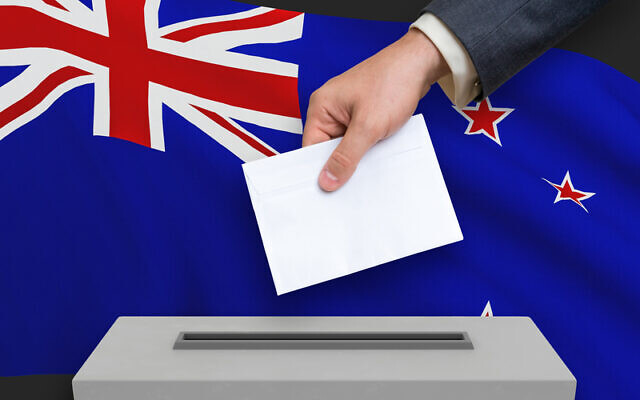Party preferences for Jewish Kiwis
'The government's response to the pandemic will be at the forefront of every voter's mind, but for Jewish community members, community-related issues will still have relevance'.
THREE years ago, when the last general election was held in New Zealand, the Jewish community was still reeling from the National Party-led government’s role in promoting UN Security Council resolution 2334. Passed at the end of 2016, that resolution, labelling East Jerusalem and the West Bank as occupied Palestinian territory, was co-sponsored by New Zealand. Our then foreign minister played a pivotal role in pushing it through.
Three years on, things are very different. The National Party, now in opposition and which has had four leaders since that resolution, has apologised for its role facilitating it and worked to make amends, especially through its MP Alfred Ngaro, who heads the New Zealand-Israel Parliamentary Friendship Group. New Zealand’s Muslim community suffered a devastating white supremacist attack at two mosques in Christchurch 18 months ago, resulting in 51 deaths, forcing our synagogues to shut (on police advice) for the first time ever. And who would have foreseen then that our synagogues would have to shut a year later, due to a pandemic?
Our election, originally set down for September 19 (Rosh Hashanah), has been deferred to October 17 due to a resurgence of COVID-19. It is likely that the Labour-led government’s response to the pandemic will be at the forefront of every voter’s mind, but for Jewish community members, community-related issues will still have relevance.
The Labour Party has worked hard to strengthen relations with the Jewish community, its efforts being led by Minister for Ethnic Communities Jenny Salesa. It has provided significant support in various forms, in the wake of the Christchurch terrorist attack. The Prime Minister, Jacinda Ardern, attended the UNIHRD service in Auckland this year. Regarding Israel, Labour has mostly remained quiet and left matters to be dealt with by the Minister of Foreign Affairs, Winston Peters, who belongs to a different party, New Zealand First, although it did sign an innovation agreement with Israel earlier this year, many years in the making. The Prime Minister’s only public comment on Israel was after the Palestinian riots when the US moved its embassy, when she said she was concerned by the “devastating, one-sided loss of life”. However, the Labour MP who is most outspoken on Israel, Dr Duncan Webb, a minor backbencher, advocates for BDS and lobbied against the Wellington City Council adopting the International Holocaust Remembrance Alliance definition of antisemitism.
New Zealand First, which held the balance of power at the last election and formed a coalition with Labour, was very critical of Resolution 2334 prior to the election and made various promises about a favourable stance on Israel. However, even though its leader holds the Foreign Affairs portfolio and is widely believed to have wielded much influence over the government, its UN voting record and unwillingness to review UNRWA funding has been very disappointing. One of NZ First’s MPs has made what many consider to be antisemitic “jokes” in Parliament. On current polling, it may not return to Parliament.
The Green Party, which has a confidence and supply agreement with the government, has not shown much interest in fostering relations with the Jewish community. Before the last election and prior to becoming co-leader, Marama Davidson went on a “women’s boat” to Gaza, prerecording a video about her “kidnapping” by the “Israel occupation forces”. Since the last election, one of their MPs has publicly accused Israel of genocide and apartheid, and stated that Jesus’s mother Mary was a “Palestinian refugee”. The Greens will probably squeak back into Parliament.
The libertarian ACT Party, currently with one MP in Parliament (David Seymour) but predicted under all polls to have more after the imminent election, appears to have a pro-Israel stance, although not formalised. Certainly, Seymour is a strong supporter of the Jewish community.
In terms of minor political parties that are not currently represented in Parliament, two have explicitly favourable positions on Israel. The New Conservatives, which promotes what it describes as family values and Judeo-Christian principles, has an especially staunch pro-Israel position. It supports establishing an Israeli embassy (currently and bizarrely the ambassador to Turkey is accredited to Israel), recognising Israeli sovereignty over the Golan Heights, withdrawing UNRWA funding, and apologising to Israel for Resolution 2334, as well as adopting the International Holocaust Remembrance Alliance definition of antisemitism. ONE Party, a Christian party, also wants to develop closer ties with Israel, including by establishing an embassy there and building strong trade relationships. Neither party is likely to make it into Parliament.
Special dishonourable mention must go to a new party, New Zealand Public Party, led by Billy Te Kahika, which has now formed an alliance with another party Advance New Zealand. The Public Party apparently believes that COVID-19 is a bioengineered virus weapon that is spread by 5G and was released in Chinese labs to help inspire chaos that would allow for a shadowy one-world government run out of the UN to take over the planet, or something like that. Unsurprisingly, Te Kahika also has some interesting thoughts on the Rothschilds, Zionism which is “rape and infiltration” of Jews’ identity and religion, and Judaism, which is a “satanic deception”, but is at pains to point out that even though the Jews killed Jesus, that doesn’t mean he hates them. He is unlikely to end up with a seat in Parliament, but his social media following is increasing significantly.
Currently, polls show that a Labour-led coalition will win by a substantial margin, and that Labour may even have the numbers to govern alone. But this is 2020 after all, and if we have learned anything from this year, it’s that anything could happen.
Juliet Moses is spokesperson for the New Zealand Jewish Council.


comments